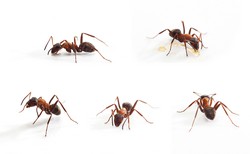Epigenetic effects in social insects
Epigenetic changes in the genome allow the expression of genes to be varied without a change in the actual DNA. In vertebrates, methylation, an important type of epigenetic change, takes place largely in promoter regions that initiate gene transcription. In insects, however, methylation occurs in other regions of a gene, indicating a different role. The EU-funded ANTEPIGENETICS (The role of epigenetics in the regulation of reproduction and behavior in insect societies) project has compared DNA methylation patterns that characterise both the reproductive queen-like behaviour and brood care phases in the clonal raider ant. Using methylation-sensitive amplified fragment length polymorphism, bisulphite sequencing and RNA sequencing on C. biroi brains, the researchers discovered some interesting contrasts. DNA methylation did not differ significantly between the two phases and was more often found in genes with high and stable expression between phases in core functions – protein synthesis, transport and binding. Analysis revealed that a high proportion of DNA methylation, as high as 41 %, was in cytosine-guanine-linked nucleosides as a result of either biological or experimental variation. Moreover, methylation-rich genes are significant in their ontology and are related to protein synthesis, transport and binding. Study outcomes suggest that epigenetic changes are not involved in regulating the reproductive and behavioural dynamics during the C. biroi colony cycle. However, the researchers advise more careful interpretation of available data to clarify the role of genome-wide variation in DNA methylation. ANTEPIGENETICS research provided new insight into the role of epigenetic change in insect societies. As these changes affect the very backbone of protein synthesis and utilisation, further research promises to uncover important roles for the modification of gene expression. Results of the ANTEPIGENETICS study have been published in Current Biology.







